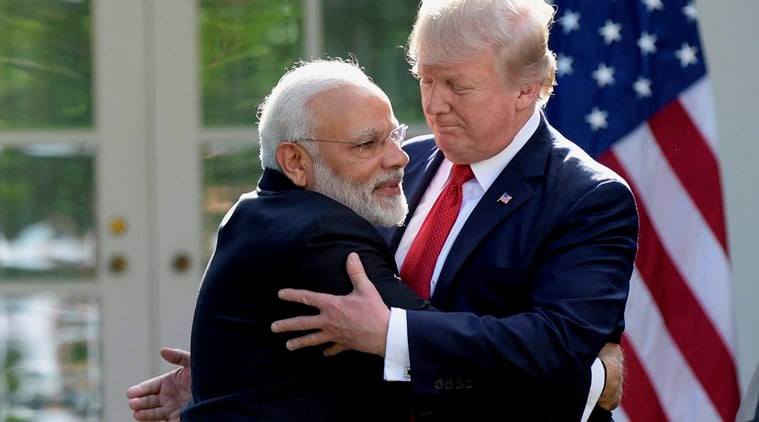
Washington : President Donald Trump and Indian Prime Minister Narendra Modi hug while making statements in the Rose Garden of the White House in Washington, Monday, June 26, 2017. (AP/PTI)
In their June 26 meeting President Trump and Prime Minister Modi voiced their mutual admiration as the nations grapple with a complex relationship. Ultimately, India’s tradition of electoral democracy makes it a friend. Though we also share strategic interests, we should take care to base our relations on the deeper values.
Mr. Trump’s and Mr. Modi’s styles may make them compatible. Both were elected by majoritarian populist movements. Both boast large Twitter followings. Both, in Trump’s original travel ban and Modi’s elimination of large bank notes, have sprung hasty policy moves on their countries that led to turmoil. Mr. Trump apparently also now sympathizes with India in its rivalry with China, over his disappointment at the latter’s inaction toward North Korea. A U.S. sale of surveillance drones to India reinforces this common interest, in a strategic counter to China’s “One Belt” projection of economic power across Central Asia and the Indian Ocean.
Interests could diverge, partly in Trump’s immigration-unfriendly plans, and his populist-driven pullout from the Paris Accords. Modi criticized the latter. On immigration, the two countries have unique issue, in the question of the specialized H-1B visas for persons of unique skills—IT driven in this case—to work in the US. India has also been an advocate of free trade, reflecting the interests of a developing economy. These issues were muted at the summit, and many strong rationales for reconciliation are available.
The U.S. should take care that the rationales we invoke, to bolster friendship or to manage differences, rest on the values of freedom and rights. Economic interests can evolve to put us at odds, and strategic calculations have not always brought us together.
But it was Indian-born Amartya Sen (politically opposed to Modi but not renounced in this) who defined both freedom and development as “the expansion of the ‘capabilities’ of persons to lead the kinds of lives they value – and have reason to value.”
Which sounds a lot like Life, Liberty and the Pursuit of Happiness.